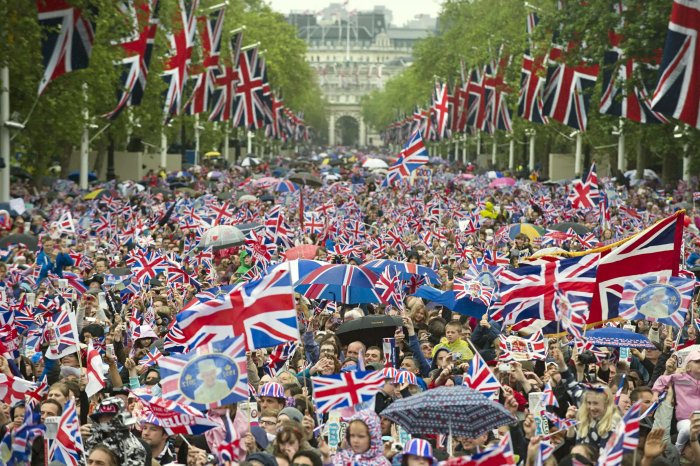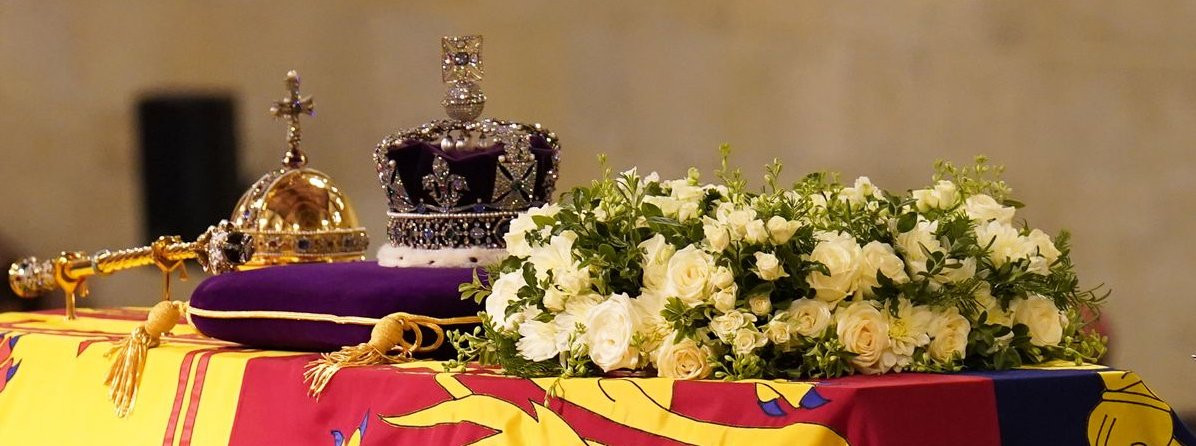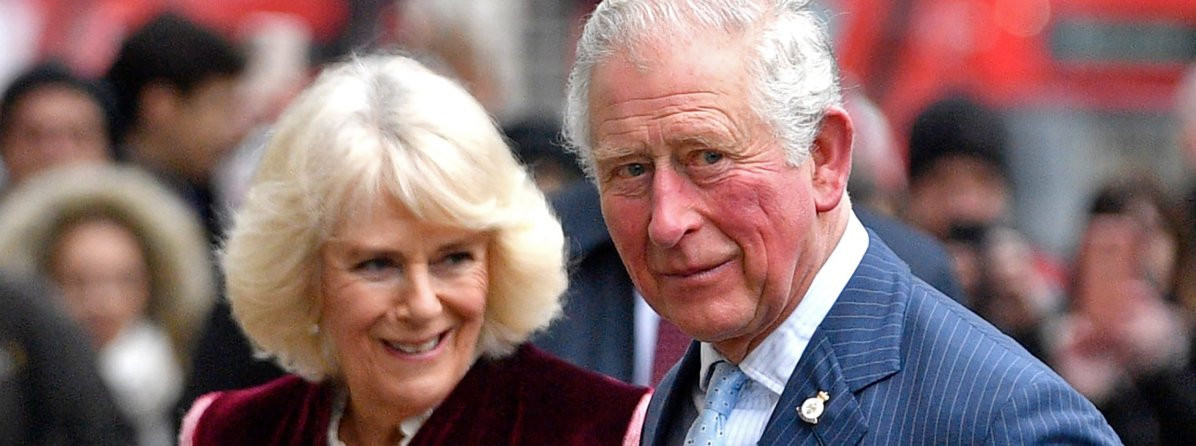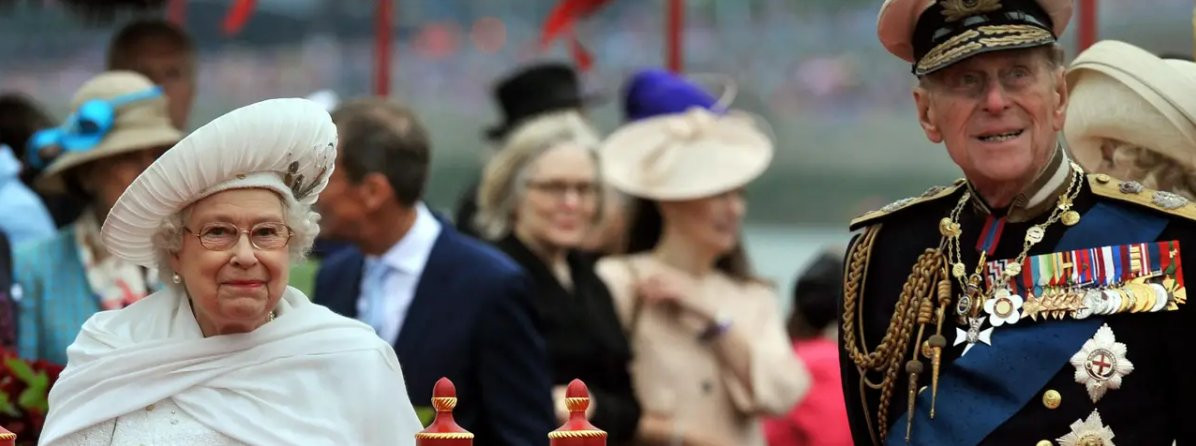
The Queen's Platinum Jubilee
“The Royal Household has always worked quite closely with broadcasters, especially the BBC”
Article by John Winterson Richards
The celebration of Queen Elizabeth II's "Platinum Jubilee" was first and foremost a television event. The same has been true of all the big Royal Events in the 21st Century and reflects a broader cultural change. The Queen's first big Jubilee, her Silver Jubilee in 1977, had millions of people literally out in the streets, holding parties and the like. Although the Platinum Jubilee made some effort to encourage them, only a few thousand were held. Like the "Golden Jubilee" in 2002 and the "Diamond Jubilee" in 2012, the Platinum Jubilee was planned in the knowledge that people are now more likely to participate in an event "virtually" than physically go to another place and attend in person. This is, of course, just part of a much bigger social trend.
As such the Platinum Jubilee might prove to have been an important milestone in British cultural history as the last time a substantial portion of the population of the United Kingdom united to participate, even "virtually," in any common celebration not sports related. What else is there? Public holidays used to be just that, "Holy Days" in which practically the whole community took part - if not necessarily in the religious services themselves then in less religious events for which the Holy Day provided a convenient pretext. Now Christmas, Easter, St Valentine's Day, and All Hallows are just excuses for private consumption, not really communal events at all. The commemoration of various War related anniversaries caught the public imagination for a while but are now themselves fading into history: the recent 40th Anniversary of the Falklands War, which involved only a relatively small number of combatants, was barely noticed by the mainstream media.
Of course, at the time of writing, there is one sadly imminent Royal event that is likely to bring the population together, but it is unlikely to be much of a celebration, even if it is now the fashion to label funerals as such. The Platinum Jubilee may have been the last time a substantial proportion of the population came together joyously other than for a sports event.
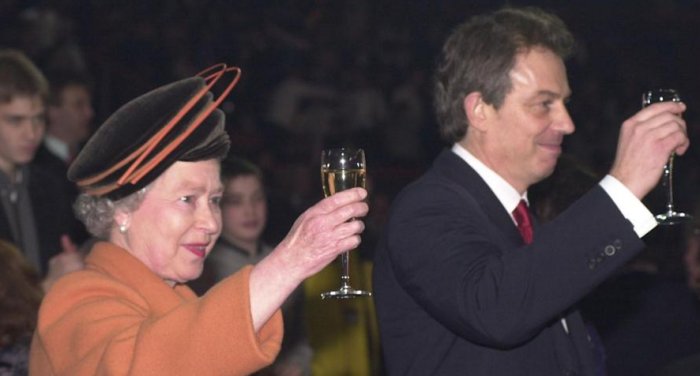
Whatever one's political view of the Monarchy as an organisation, it is impossible to deny that in practice it was a unifying force in Britain throughout the reign of Queen Elizabeth II and that attempts to construct non-Royal substitutes have usually fallen flat. Indeed, the Queen was often called in to prop them up - one thinks of the excruciating "Millennium Dome" celebrations, of which the abiding image is of the Queen gamely trying to make the best of a bad job. The Queen had a particular gift for turning crisis into opportunity: her broadcast during the coronavirus "lockdown" was a masterpiece, calming public fears by putting them in their context and stressing continuity, as only an old lady who had seen far greater crises could have done. Even the disaster of Princess Diana's tragic death, and the dangerous wave of raw emotion that followed, was turned into another triumph as the Monarchy transformed itself into the focus for public grief, the whole "soap opera" being played out in television.
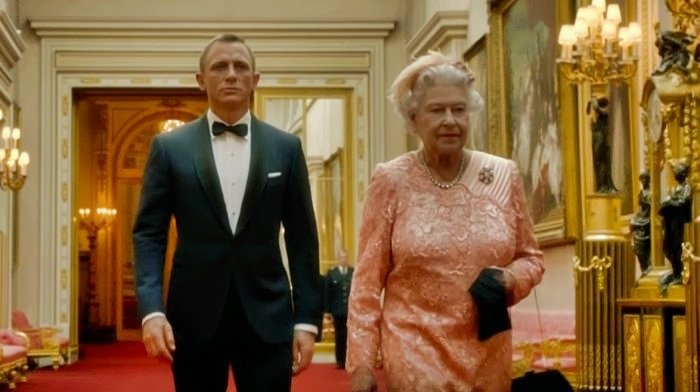
On a happier note, the Queen showed her adaptability and sense of humour by committing completely to a James Bond parody that opened the 2012 Olympics. It was that moment that convinced many that what was widely assumed to be another Great British Mess might actually turn out rather well after all, and so it did.
None of these events should be seen in isolation. They are part of an ongoing strategy to present the Monarchy as modern and relevant while still representing continuity and tradition, and television is central to that strategy.
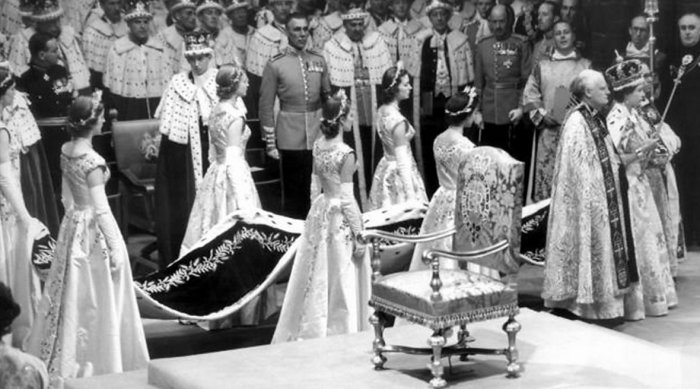
For all its hidebound image - itself, at least in part, cultivated quite deliberately - the Royal Family has always had an acute awareness of the power of television. This was apparent from the start when potential objections to full coverage of the Coronation were overridden quite ruthlessly. It should be noted, however, that the Monarchy's supposed greater openness was actually a way of controlling the images it delivered. The same is true of Royal participation in subsequent documentaries about the Monarchy which purported to present intimate portraits of the Royal Family but which were really projecting a carefully curated corporate image.
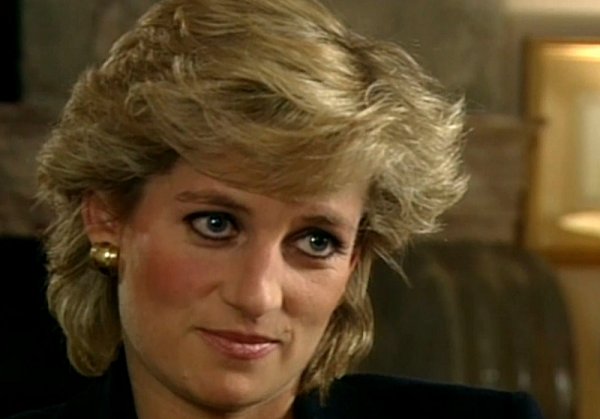
There have been times when individual Royals have gone badly off message. Ill-advised interviews by Princess Diana, the then Prince of Wales, the Duke of York, and the Duke and Duchess of Sussex did immense damage, not least to the interviewees, and the less said about 'It's A Royal Knockout' the better, but Elizabeth II herself always understood that moments of apparent intimacy and humour are most effective in the context of the general "mystique" of the Monarchy. The need to balance "mystique" and modernity has been a major theme of the reigns of the last four Monarchs, and Elizabeth II proved herself the Grand Master.
The Royal Family, in common with the more adaptable element of the Aristocracy in general, have long understood the wisdom of the Prince of Lampedusa, who wrote "If we want things to stay as they are, things will have to change."
They have therefore always been good "early adopters" of new technologies, and television is a case in point. They probably do not watch it much themselves, but they have a good grasp of its influence, its limitations, and its techniques, or at least they are evidently advised by people who do.
The Royal Household has always worked quite closely with broadcasters, especially the BBC, and has built up considerable organisational expertise of its own in television production. Most big Royal events are planned with the television coverage in mind. There is obviously great sophistication at work in the selection of camera angles, lighting, sound design, and the like.
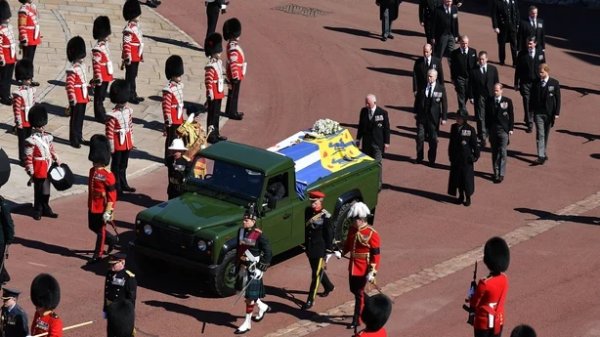
The Funeral of the Duke of Edinburgh, the last big Royal event before the Platinum Jubilee, was a case in point. The image that sticks in the mind is of the Queen sitting alone in the Chapel, mourning the man she loved but still obedient to the coronavirus regulations, the very epitome of duty. That is exactly what was intended.
Like any film or television producer, the Royal Household understands that a successful production usually comes down to such an image, a picture that speaks a million words and sums up the whole production - or perhaps a scene.
That is true of the television coverage of the last three big Jubilees. Each came down to a single scene.
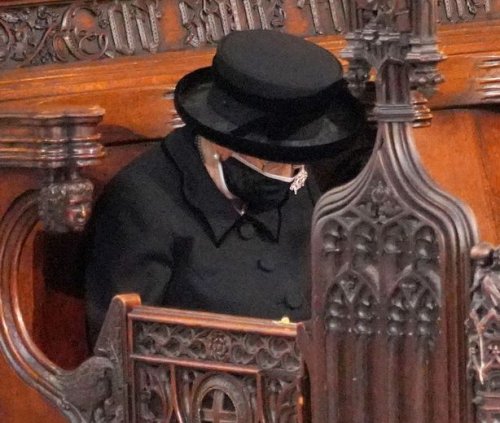
The first big Jubilee of the new Millennium was the Queen's Golden Jubilee in 2002. Mr Blair was in Downing Street and the emphasis was very much on modernity rather than "mystique." This was exemplified by the "Party at the Palace," a concert of contemporary music in the grounds of Buckingham Palace, mainly by musicians of whom the Queen had probably never even heard. The abiding image of this is probably Brian May playing the guitar in classic rock star pose, legs wide apart, on top of the Palace. It seemed a statement of modernity's triumph over tradition.
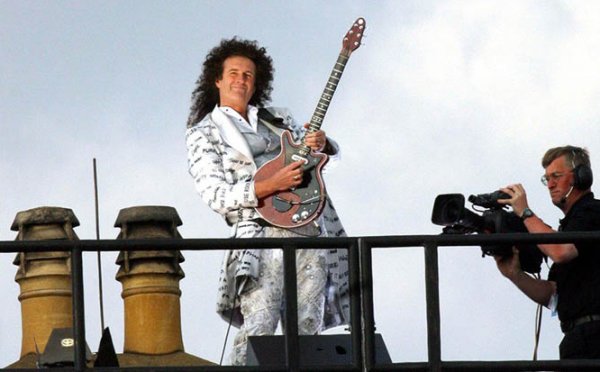
We were all feeling a lot less brash by 2012 when the Queen's Diamond Jubilee rolled around. In the aftermath of the 2008 financial crisis, the Queen herself instructed that celebrations should be scaled down and people should not be "forced" to celebrate. They did anyway. A feeble anti-Monarchist demonstration at the biggest event, a parade of over 600 boats on the Thames, actually reinforced the point that most people wanted to enjoy the day and pay tribute to their Monarch. The Thames Pageant itself was well conceived and well organised. The highlight was a clever puppet horse running up the National Theatre, which had hosted the stage version of 'War Horse.' The Queen was amused - as she usually was by anything to do with horses.
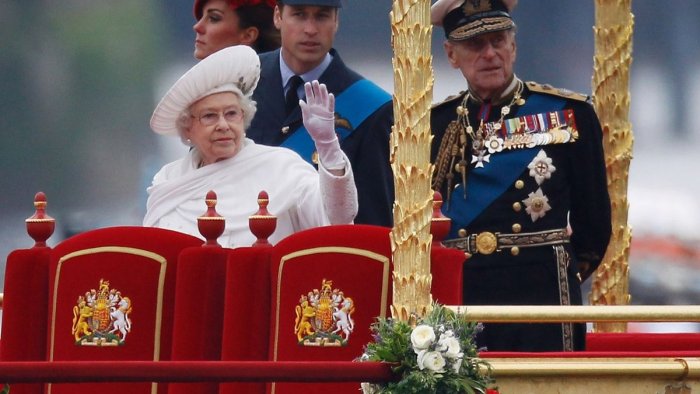
The television transmission of the event was, however, a rare Royal failure by the BBC, where the coverage of big Royal occasions was traditionally one its great strengths. There were so many interesting aspects to that Pageant which the commentary ignored completely. There would be mentions of the presence of historic ships and then no more said about them than that. Instead the transmission would cut away to pointless 'The One Show' type "segments" of "celebrities" jabbering mindlessly or "ordinary people" doing supposedly "ordinary people" things that were somehow meant to adding to the "fun." It was almost a relief when the Heavens opened and the rain began to fall ...and the event got its defining image after all: a choir literally soaked to the skin continued to sing bravely in full voice, watched by the Queen and the Duke of Edinburgh, both standing stoically, the Duke, then 90, upright in heavy full dress uniform, complete with several pounds of decorations. It was the complete reversal of 2002: tradition could still teach modernity a thing or two.
It was no surprise after that iron man performance that the Duke had to withdraw from the rest of that week's celebrations for health reasons, and by the time of the next big Jubilee, in 2022, he was gone. His passing the year before set an elegiac tone to the Platinum Jubilee. Not only were we aware of the absence of the great love of the Queen's life - we were also increasingly aware of her mortality.
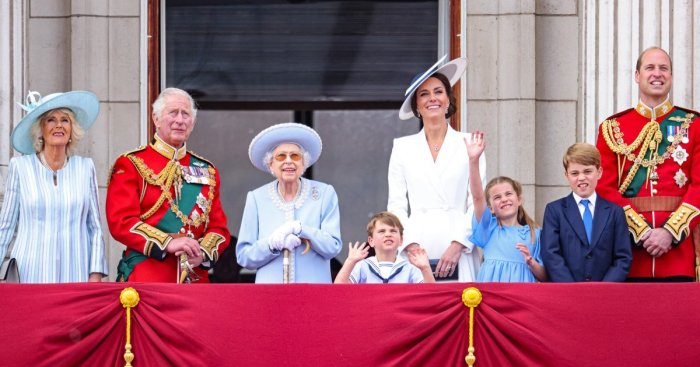
With a general, unspoken awareness of the strong possibility that there might have to be last minute changes, there was nothing particularly spectacular or original in the list of the main events of the Platinum Jubilee - Trooping the Colour, a Fly Past, a Service of Thanksgiving at St Paul's, Beacon Lighting, and another concert at Buckingham Palace. The opening act of the concert even referenced the original 2002 'Party At the Palace' with Brian May playing the guitar - except now the ageing rocker was safely at ground level, on the Queen Victoria Memorial in front of the Palace, not dangerously high up on the roof. It was symbolic in itself.
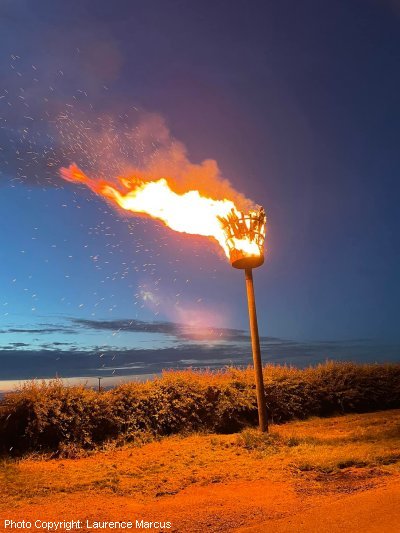
As anticipated, the Queen was unable to attend all the events in person, but everything worked well, with none of the broadcasting mistakes or natural disasters that plagued, but still did not spoil, the 2012 Thames Pageant. The BBC got it right by going back to basics, but there was also praise for Dame Joanna Lumley's commentary on Sky, showing how coverage had changed, monopoly having become diversity. The ratings were excellent, proving the Queen was still a huge draw, as was the level of global coverage. The concert was the most viewed television show of the year in the UK at that point.
More importantly, the Jubilee got its defining moment. Introducing the concert was a gentle comedy sketch, in the same style as the James Bond introduction to the 2012 Olympic Games but with a very different tone. The Queen was shown having tea - and marmalade sandwiches - with Paddington Bear.
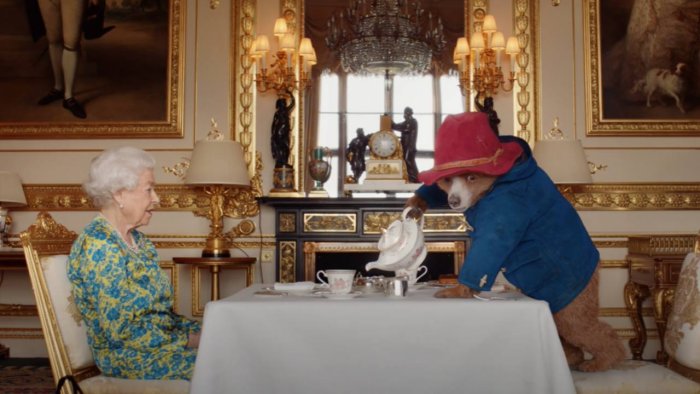
This was, of course, the recent film version of Paddington, not the classic television Paddington some of us purists would have preferred - Sir Michael Hordern, sadly, being unavailable. Nevertheless the whole thing was carried off with perfect good taste. The Queen really threw herself into the role. It is a challenge even for a professional to interact with a ball representing a later CGI insert but she rose to the occasion magnificently. She did not make the amateur mistake of trying to be funny. She played it straight - with just a hint of the famous twinkle in her eye.
Paddington's final line spoke for the nation. Although we hoped she might go on to her 75th Anniversary - after all, her mother made 101 despite a notable consumption of alcohol - and possibly even her 80th, it would have been unlikely that she would have been able to take much of an active role in the celebrations. So, one way or the other, we knew, deep down, that the whole Platinum Jubilee was really a valediction, and now, three months on, we are glad Paddington said it for all of us while she was still here to hear it:
"Thank you for everything."
